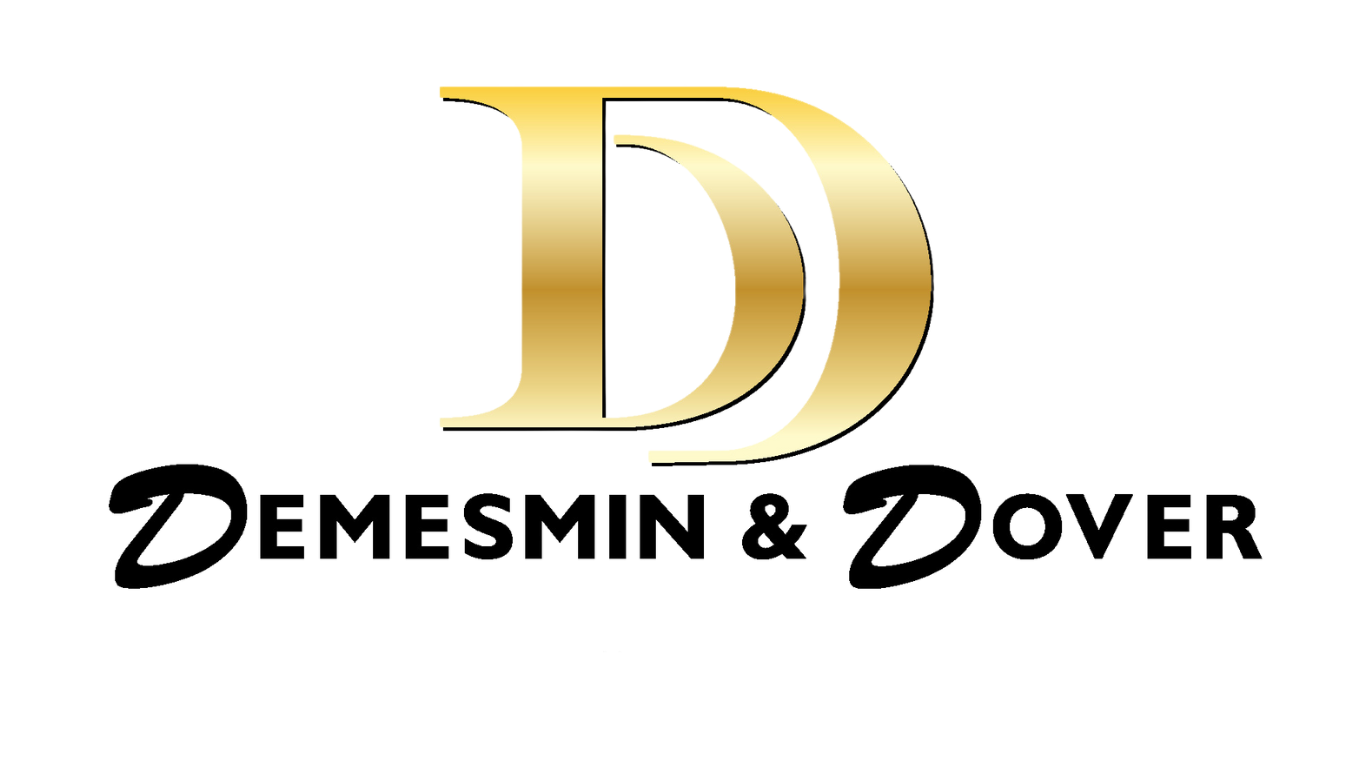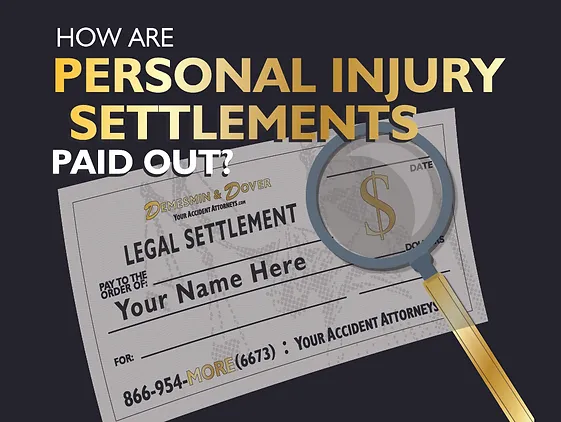After an accident, it is important to get the help you need. If you have decided to utilize a personal injury attorney, the most common result is a personal injury settlement. About 95% of personal injury cases are settled outside of a courtroom.
So what happens once an agreement is reached for a personal injury settlement? Well, you get paid, but if you wondering what that distribution looks like, our accident attorneys are here to help.
Steps to take before settling to ensure you get the best compensation…
Seek Medical Treatment: The first and most important step is to seek medical treatment for your injuries. This not only helps ensure that you receive the appropriate medical care, but it also establishes a record of your injuries and the treatment you received. This documentation can be used as evidence in your case to demonstrate the severity and extent of your injuries.
Document the Accident and Injuries: It is important to document the accident and your injuries as thoroughly as possible. Take photos of the accident scene, your injuries, and any property damage. Keep copies of any police reports, medical records, and other relevant documents.
Gather Witness Information: If there were any witnesses to the accident, be sure to obtain their contact information. Witness testimony can be valuable evidence in a personal injury case.
Consult with an Experienced Personal Injury Attorney: A personal injury attorney can evaluate your case, help you understand your legal rights, and advise you on the best course of action. An experienced attorney can also negotiate with insurance companies on your behalf and represent you in court if necessary.
Be Honest and Transparent: It is important to be honest and transparent with your attorney about the accident, your injuries, and your medical history. Any inconsistencies or inaccuracies in your story can be used against you in court.
Keep Records of Expenses and Losses: Keep track of any expenses or losses related to the accident, such as medical bills, lost wages, and property damage. This information can be used to calculate your damages and determine the amount of compensation you are entitled to.
Don’t Rush to Accept Settlement Offers: Insurance companies may try to offer you a quick settlement to avoid a lengthy and expensive court battle. However, it is important to carefully consider any settlement offer and consult with your attorney before accepting it. Once you accept a settlement, you waive your right to pursue further compensation.
Who Pays the Bills/Your Settlement?
A full overview of how your personal injury settlements are distributed.
If you have reached the point where an agreement is made regarding your personal injury settlement, then it is only natural to wonder exactly how and when you are going to get paid.
That is why it is extremely important to understand how the funds will be distributed. In most cases, those funds will be used to cover various expenses related to your injury, such as medical bills, lost wages, and pain and suffering.
However, there may be additional expenses that you are responsible for paying outside of the settlement as it may not cover everything.
Medical Expenses
These expenses can include emergency room visits, doctor’s appointments, surgeries, physical therapy, and prescription medication.
In many cases, your settlement will be used to cover these expenses as well as your initial 10,000 in.
Lost Wages
If your injuries prevented you from working, you may have lost wages as a result.
Pain and suffering can include physical pain, emotional distress, and other intangible losses.
While this damage can be difficult to determine, your personal injury lawyer can help ensure you gain the proper financial compensation for your accident.
Legal Fees
In some cases, you may be responsible for paying legal fees out of your overall settlement. This can include attorney’s fees, court costs, and other legal expenses.
Since most personal injury attorneys work on a contingency fee agreement their portion will come out of the settlement payout.
What is a Lump-Sum vs. Structured Settlement
When someone receives a personal injury settlement, they may have the option to receive the compensation in a lump sum or as a structured payment.
Lump Sum Payment:
A lump sum payment is a one-time payment of the entire settlement amount. The advantage is that the recipient has complete control over the money and can use it immediately as they see fit.
However, there are some disadvantages such as that money is subject to taxation, depending on the laws of the jurisdiction in which the recipient resides.
It is also important to understand that the money is meant to cover expenses you may have incurred from your accident including medical and attorney fees.
Structured Settlement:
This type of settlement is a payment plan that spreads the amount of money received over some time. That means your settlement will be paid on a set schedule either monthly or annually.
Structured settlements are not the best if you need the money for urgent expenses, as you do not get the full amount upfront.
If you are trying to decide between the two payment methods it’s important to consider your immediate needs. That is why if you consult with they can help you determine which option is best suited for your specific situation.
HOW DO I COLLECT MY SETTLEMENT CHECK?
There are numerous steps you take following an agreed-upon settlement amount and the collection of that amount.
Review the Settlement Agreement: Before you can collect your settlement check, you will need to review and sign the agreement.
Confirm Payment Method: Once you have signed the settlement agreement, you will need to confirm the payment method for your settlement funds.
Provide Necessary Documentation: To ensure that your settlement funds are processed correctly, you will need to provide any necessary documentation, such as a release form or proof of identification. Your attorney can help you determine what documentation is required and assist you in providing it to the appropriate parties.
Wait for Funds to Clear: Depending on the payment method you have chosen, it may take several days for your settlement funds to clear. Be patient and do not spend any of the funds until they have cleared and are available in your account.
Contact Your Attorney with Any Questions: If you have any questions or concerns about collecting your settlement check, do not hesitate to contact your attorney. They can help guide you through the process and ensure that you receive your funds in a timely and secure manner.
ARE TAXES PAID ON PERSONAL INJURY SETTLEMENTS?
The answer to this question depends on several factors, including the type of damages awarded.
In most cases, compensation for physical injuries or illnesses is not taxable under federal tax law.
This includes damages for medical expenses, lost wages, and pain and suffering. This means that you do not need to pay taxes on these types of damages, regardless of the size of the settlement.
Compensation for Emotional Distress or Punitive Damages
Compensation for emotional distress or punitive damages may be taxable under federal tax law. This is because these types of damages are considered to be a form of income, rather than compensation for physical injuries or illnesses.
If your settlement includes compensation for emotional distress or punitive damages, you may be required to pay taxes on these amounts.
If your settlement includes a lump sum payment that is invested and earns interest, you may be required to pay taxes on the interest earned.
This is because the interest is considered to be income, rather than compensation for physical injuries or illnesses.
Tax Planning and Professional Advice
If you are unsure about whether or not you are required to pay taxes on personal injury settlements, it is recommended that you speak with a tax professional or an attorney who specializes in personal injury law. They can help you understand the tax implications of your settlement.
Why do I need the help of a personal injury attorney?
Personal injury cases in general are tough to navigate. You also have so many things to deal with whether it be medical bills, lost wages, or numerous other things.
Having a dedicated accident attorney to help you with your case can only help you focus on the things you have to do while they handle the rest. Here are some things your attorney can help you with to ensure that your personal injury settlements compensate the damages you incurred.
Legal expertise: Personal injury attorneys understand the laws and regulations that govern these types of cases. They will negotiate with the insurance company for you and ensure that you receive the compensation you deserve.
Objectivity: After suffering from an injury, it can be challenging to make objective decisions. A personal injury attorney can provide you with an objective perspective and advise you on the best course of action.
Maximizing your compensation: Personal injury attorneys have the skills and experience to negotiate with an insurance company. They know how to evaluate the full extent of your damages, including medical bills, lost wages, pain and suffering, and other expenses, to ensure that you receive the compensation you deserve.
Trial experience: While most personal injury cases settle out of court, some cases may require a trial. A personal injury attorney has the trial experience necessary to represent you in court and advocate for your rights.
If these weren’t enough of a reason for you to call a personal injury attorney, then let us give you another. We here at Demesmin and Dover Law Firm truly handle every case that comes through our door personally.
We want to ensure that you can get back to your family, friends, and loved ones rather than dealing with all of the other things that come after being in a car accident. We truly care about getting you the compensation you deserve so you can get back to your normal schedule. So call us for your free consultation at 866-954-MORE (6673).


